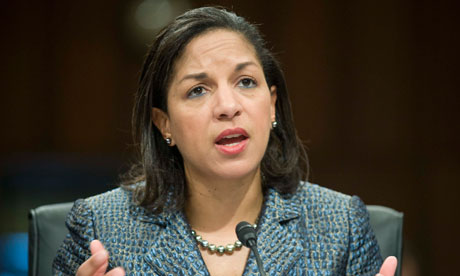Gaddafi 'supplies troops with Viagra to encourage mass rape', claims diplomat
US ambassador Susan Rice has also said, without offering evidence, that Iran was helping Syria to suppress dissent
- ,

Gaddafi claims made by Susan Rice have been treated with scepticism by foreign affairs specialists. Photograph: Kevin Wolf/AP
One of America's most senior diplomats claimed at the United Nations security council that Muammar Gaddafi is supplying his troops with Viagra to encourage mass rape, according to diplomats.
Susan Rice, the US ambassador to the UN made the claim while accusing Gaddafi of numerous human rights abuses. Earlier in the week Rice also claimed, without offering any evidence, that Iran is helping Syria suppress internal dissent.Foreign affairs specialists expressed scepticism about both claims.
The Viagra claim surfaced in an al-Jazeera report last month from Libya-based doctors who said they had found Viagra in the pockets of pro-Gaddafi soldiers. But it is a jump from that to suggesting Gaddafi is supplying troops with it to encourage mass rape.
Rice is one of the advocates of liberal intervention in the Obama administration, along with the White House foreign affairs adviser Samantha Power, and helped persuade President Obama to intervene in Libya.A UN diplomat at the closed session on Thursday said: "I was in the room when she mentioned Viagra. The remark did not cause a stir at the time. It was during a discussion about whether there is moral equivalence between the Gaddafi forces and the rebels. She listed human rights abuses by Gaddafi's forces, including snipers shooting children in the street and the Viagra story."
She was trying to persuade doubters that Libya was not just a civil war and that Gaddafi was encouraging human rights abuses. Russia and China have complained that the military strikes on Libya are going beyond the UN mandate.
The US role in Libya, though limited, has also provoked a debate in Washington over whether Obama is ditching his pragmatic foreign policy in favour of so-called liberal intervention, basically fighting just wars. The defence secretary Robert Gates, one of the bulwarks against liberal intervention, is to retire at the end of June.
Earlier in the week, Rice deplored the Syrian president Bashar al-Assad's crackdown on dissent and cited Iranian involvement. "Instead of listening to their own people, President Assad is disingenuously blaming outsiders, while seeking Iranian assistance in repressing Syria's citizens, through the same brutal tactics that have been used by the Iranian regime.
"The United States will continue to stand up for democracy and respect for human rights, the universal rights that all human beings deserve in Syria and around the world."
Asked about evidence of Iranian involvement, Rice said: "I'm not going to get into a great deal of detail on that, but we have said repeatedly that we are very conscious of and concerned by the evidence of active Iranian involvement and support on behalf of the Syrian government in its repression of its people."The state department said it has credible information but would not elaborate.
The Wall Street Journal reported that Iran was providing equipment to help crack down on protesters and to block their use of mobile phones and the internet, as the Iranian government had done when faced with its own internal revolt.
Michael Eisenstadt, a military and security specialist at the Washington Institute for Near East Policy, said it was likely Iran was giving advice. But the Iran success against dissenters had been based on years of preparation and he was sceptical that Syria could replicate it in the short term.
He said: "And the Syrians seem to be taking a different approach as well, one that makes widespread use of firearms, while the Iranians have generally armed their internal security forces with less lethal means, such as teargas, truncheons, chains, and the like, to reduce the lethality of their response, and to scare off the more faint-hearted among the opposition.
"Also, there is a heavy psychological warfare component to the Iranian response that seems to be lacking in the Syrian action,. So it is not clear that the Syrians are listening to whatever advice they are receiving."
As part of the debate over liberal interventionism, Jacob Heilbrunn, a foreign affairs specialist, in a lengthy article in the current issue of National Interest wrote, in relation to Libya: "No doubt the Obama team was itself torn on the issue of intervention. It entered office emphasising realist tenets. Now it is jettisoning them."
He added that the new elite in favour of intervention "is united by a shared belief that American foreign policy must be fundamentally transformed from an obsession with national interests into a broader agenda that seeks justice for women and minorities, and promotes democracy whenever and wherever it can -at the point of a cruise missile if necessary."The UN human rights council discussed in Geneva on Friday whether the killings of protesters in Syria amounted to a crime against humanity.



No comments:
Post a Comment